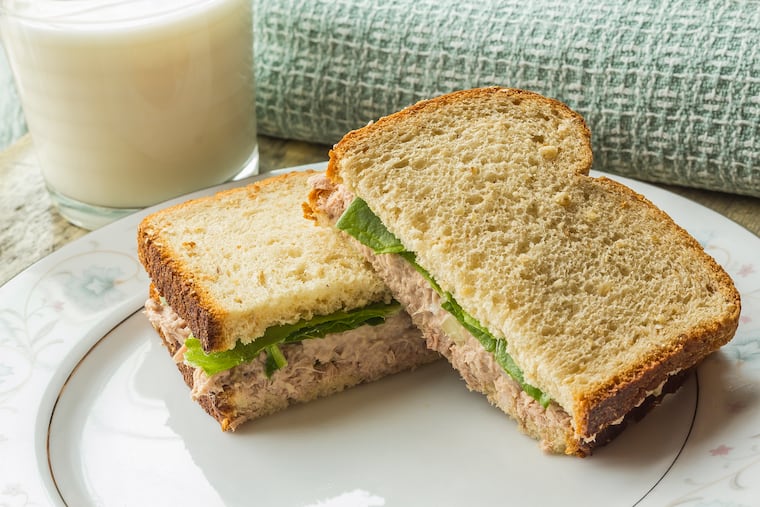Students with a $20 lunch debt won’t get a school lunch, N.J. district proposes
Under the policy, kids $10 in debt would get a tuna fish sandwich and carrots. At $20, they'd get nothing to eat.

The Cherry Hill school district is considering a stricter policy for students who don’t pay their overdue lunch bills. After the first $10 in debt: Their lunch will be a tuna fish sandwich. Those who owe $20 or more will get no lunch at all until the debt is paid.
Assistant Superintendent Lynn Shugars unveiled a proposal to tweak the district’s tuna fish sandwich policy at a school board meeting Tuesday night, citing a $14,343 meal debt incurred by about 343 students in the South Jersey school district. She said the district opted for tuna fish over peanut butter “because we know that our little ones would probably very happily eat peanut butter and jelly sandwiches until the end of time.”
Community activists and parents immediately blasted the plan as lunch shaming for children whose parents may be unable to pay the bill. Located about 20 miles from Philadelphia, Cherry Hill is the 11th-largest public school district in New Jersey and enrolls nearly 11,000 students.
“You can’t send kids to school and not feed them,” said parent Rick Short, who has four students enrolled in the district. “It’s just not right. This is a very unfair system that needs to be fixed."
Last month, a Northeastern Pennsylvania school district made national headlines after it threatened to place in foster care children whose parents had not paid their school-lunch bills.
After a public outcry, the Wyoming Valley West district reversed its decision and said it would accept the donation of a Philadelphia businessman to clear the $22,467 lunch debt.
Erin Gill, a spokesperson for Mayor Chuck Cahn, called the proposed policy “completely unacceptable.” Council President David Fleisher said it was “ridiculous” and vowed to “make sure it doesn’t happen.”
“We are a community that’s better and smarter than this!” Fleisher wrote in a Facebook post.
Barbara Wilson, a spokesperson for the Cherry Hill school system, said the district has had a long-standing unpaid-meal policy that stipulated that students who owe $20 or more would not be served, but the policy was not enforced, she said. About 20 percent of the district’s students are eligible for free lunch or reduced prices, according to the district’s website.
Superintendent Joseph Meloche said the district has “not denied any children food.” School officials are willing to work with families to wipe out the lunch debt.
“We want the kids eating. We want to help them,” Meloche said in an interview Wednesday.
In a presentation to the board Tuesday that was posted on YouTube, Shugars recommended that the meal “policy be fully followed, meaning students with accounts in arrears in excess of $20 would no longer be served school breakfast or lunch until their balance is paid.” She said the district has little choice but to enforce the policy because parents have ignored repeated phone calls and notices, sent every 10 days.
“I know that that will not be a popular decision. No one wants to see a child upset because they can’t get what they want for lunch,” Shugars admitted. “But I feel that we are at a point ... where that’s the stance that we should take.”
The $3 million meal program is self-sustaining and covers expenses for food, salaries, benefits, and equipment, Shugars said. The program had a $200,000 surplus for the 2018-19 school year, but she said it could become a deficit if the district doesn’t act. For the coming school year, lunch at the elementary and middle schools will cost $3 and $3.10 for the high schools.
“If we don’t adhere to our policy, we’re going to be perpetually, I feel, chasing after this problem,” Shugars told the board. “I have concerns that if people feel that we are not addressing it, that other people will not pay balances.”
The board listened intently and peppered Shugars with questions about the $20 threshold and whether the tuna fish sandwich should be replaced with another choice. The board took no action on the proposal. Cherry Hill has a $211 million annual school budget.
“We have to draw the line somewhere,” said board member Ruth Schultz during the meeting. “The number is small, but it will grow.”
For the previous school year, the district accrued $18,1887 in school lunch debt, with 1,723 delinquent accounts, mostly at Cherry Hill West and John Carusi Middle, Shugars said. About 1,380 of those accounts owed less than $10 and the district is not seeking to recoup those lunch fees.
Under the current lunch policy adopted in 2017, students with an outstanding balance of more than $10 get an “alternate” meal. Shugars said that meal includes a tuna fish sandwich on wheat bread and a meal that meets USDA standards with milk or juice, carrots or cucumbers, and fruit.
“It’s not just a tuna fish sandwich,” she said. “It’s an actual meal.”
Short said residents probably would be willing to make donations to clear the outstanding debt. He said the reason is apparent to students when their peers are served an alternate meal.
“It’s food shaming,” Short said.
Wilson said the district will not accept donations from its Foundation or others to pay for lunch obligations. Shugars said she believes that some parents have reasons other than financial need for not paying up.
“We are happy to work with parents,” she said.